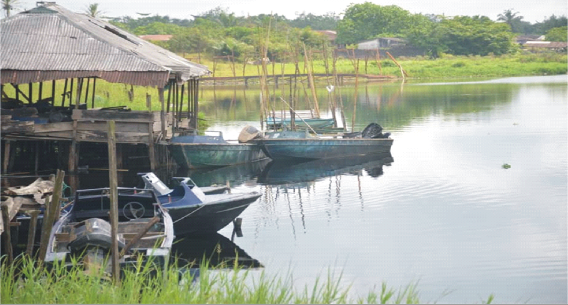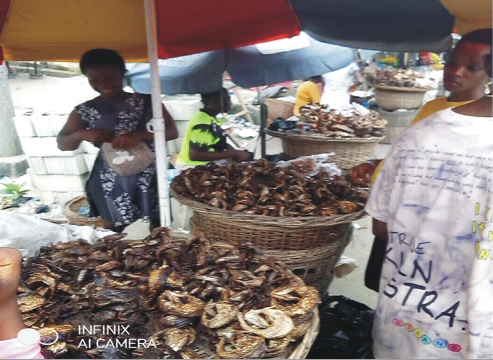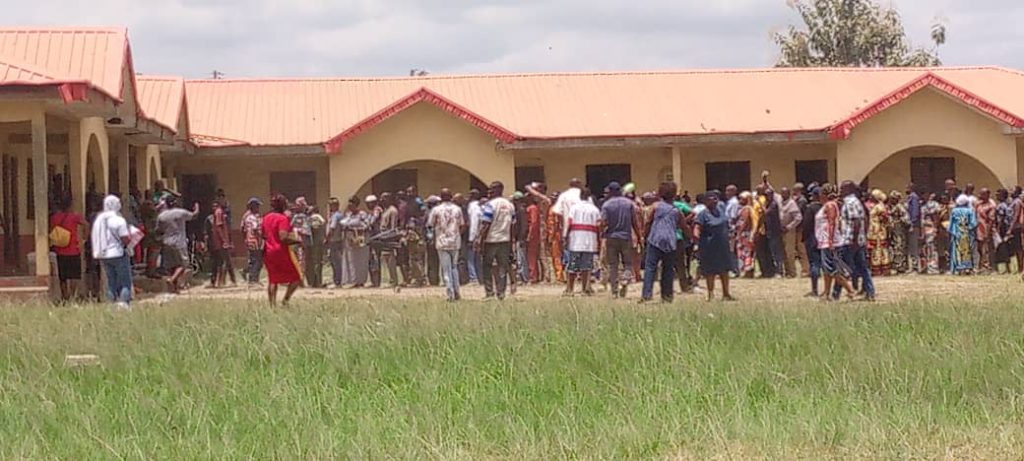Foreigners crippling our business fortunes – Ilaje fishermen
By Adetokunbo Abiola
|
Taiwo Omowunmi, a forty-year-old fishmonger, looks sad. She sits behind the table at Igbokoda in Ilaje Local Government Area of Ondo State. She gazes at the pitiable collection of croaker, tilapia and other types of fish on her table, and she keeps muttering “No fish” in the afternoon air scented with pepper and okra and Maggi cubes.
“Before, we used to have lots of croaker. We used to have lots of tilapia. We used to have bonga fish. Now, there’s no fish,” she said.
Dozens of artisanal fishermen, fishmongers, and fish merchants in IIaje sing the same song – there’s no fish, there’s no profit, there’s no gain in the fishing business. In the past, lots of fishing boats berthed at the Igbokoda Terminal, bulging with different types of fish from the Atlantic Ocean, but today, fishermen have abandoned the terminal, their fishing boats cast aside, their nets cast aside, their eyes looking desolate and angry over the “invasion” of Chinese, Singaporean, Indian, and other trawlers.
“The Chinese are the worst of them all, their trawlers catch all types of fishes but they only select the big ones whist killing and dumping back into the water the smaller fishes including the fingerlings,” said Samuel Ayadi, the Niger Delta coordinator of Artisan Fishermen Association of Nigerian (ARFAN), who spoke to Niger Delstars about Bayelsa State. He could well have been speaking about the situation in Ilaje.

Though information about the specific number of foreign ships in Ondo State has not been computed, the national total is mind-boggling. Reports by the Guardian disclosed that Chinese vessels have expanded from 13 vessels in 1985 to 462 vessels presently.
There are “too many boats fishing for too few fish” said Dyhia Belhabib, a researcher at the University of British Columbia, in a China Dialogue Ocean story in 2019. “China is easy to blame because it’s the one that is most visible … but they are not the only ones.”
“From the 1970s, commercial trawlers started encroaching on the economic rights of the coastal fishermen by destroying their fishing nets,” wrote Professor Omolere Ehinmore, a fishing researcher at the Department of History and International Studies at the Adekunle Ajasin University, Akungba-Akoko. “This is mainly a result of non-conformity to the rules of keeping to a specified nautical level.”
Nigeria’s Sea Fisheries Act of 1992 specifies five nautical miles from the coast as the limit, but foreign fishing trawlers from China, Singapore, and Europe, buoyed by hefty subsidies from their governments, breach the law and often fish in near-shore waters. Nigerian fishermen can’t compete on the level of subsidies. According to Rashid Sumaila, Professor, Ocean and Fisheries Economics, University of British Columbia, in 2019 China’s industrial fisheries got $5,952 million, the U.S.A got $3,553 million and EU got $3,814million, while Africa received a paltry $1,396 million.
Daramola Bolarinwa, Head of Office, Federal Department of Fisheries, Akure, Ondo State, explained: “We used to have subsidies for fishermen in the past,” he says. “But this ended around 2013. We had the Integrated Rural Fisheries Development Project. We had the Growth Enhancement Scheme. We had the ECOWAS Artisanal Fish Production Scheme. But that was in the past. Due to many challenges, the subsidy scheme for fishermen in the coastal areas couldn’t be continued by my department.”
In place of incentives, the fishermen in Ilaje face the challenge of the removal of fuel subsides as the government intends to roll out this change shortly, a move likely to make life harsher for those in the fishing business.
“We don’t receive separate subsidies from other Nigerians on fuel,” says Tayo Olafisoye, a fisherman in Yonren, another Ilaje community. “If the government removes subsidies from fuel, the cost of buying fuel will increase. Our ability to go into the water to fish will decrease, because the cost of buying fuel for our boats will increase, and already we’re suffering over fuel. There’ll be more hardship.”

Globally, it is predicted that climate change will reduce fish catch by 7.7 percent and revenues from it by 10.4 percent by 2050 under a high carbon emissions scenario (Lam Cheung, Reygondeau Sumaila, 2016. This decrease in the catch may be as much as 26 percent in some parts of West Africa and could even be higher in other parts of West African countries closer to the equator: a 53 percent drop in fish in Nigeria, 56 percent in Cote d’Ivoire, and 60 percent in Ghana.
In addition, fish migrate towards the poles to follow the cooler seas, making fishing at high latitudes more productive while tropical fisheries – like Nigeria’s – suffer.
This situation is exacerbated by frequent oil spills in the region. According to the National Oil Spill Detection Agency (NOSDRA) data, the total number of oil spills recorded from 2015 to March 2021 is 4,919; a large number of these in and around Ilaje.
Titus Oladele, a fisherman at Yonren,complained about an oil spill that happened in 2015. “It destroyed my net. We couldn’t fish again. The spills either killed the fish or made them to swim away to safer waters.”
“Oil spills have the tendency of spreading through the entirely affected ocean creating untoward havoc to the aquatic organisms. In the marine ecosystem, it breaks into many different chemical and physical components that float on the surface of water, suspend in the column or sink to the bottom of ocean. The resultant effects are enormous, and they include toxicity of sea bed, killing and displacement of aquatic animals, stunted growth, etc.,” wrote Saka Balogun and Buliaminu Kareem, in their 2013 report, The Effects of Oil Spillage on Aquatic Environment in Ilaje Community.
At a period when climate change, coupled with oil exploration along the Atlantic coast, pushes fish far from the shore, the foreign trawlers make what’s left of the fishing grounds along the Nigerian Atlantic Ocean a major killing field, where more fish is caught than can be sustained. In 2018, Nigeria lost US$70 million to trawlers fishing illegally in the country, according to Margaret Orakwusi, the former president of the Nigerian Trawler Operators Association. Ilaje isn’t exempt from the incursion, with the survival of local fishermen under attack.
“It’s rampant for foreign vessels to attack fishermen,” said Orioye Gbayisemore, an artisanal fisherman who organized a fishermen’s summit trying to galvanize others into a force to challenge the foreign vessels and others. “Once you set out your net, their powerful nets drag your net and the fish, and they go away with everything. Some of the vessels come from Singapore, China, India, and others. I identify them by going near them with my android phone and snapping the country flags of their vessels. They took my fishing net two years ago.” Though he did not share the photos with this reporter, he says the activities of the foreign fishermen have been detrimental.
“They not only come with powerful nets,” says Prince Akins Omoyele, who started fishing back in 1974. “They come with powerful boats. They come with powerful guns, so you can’t talk to them. They come beyond the five nautical miles stipulated for them to fish. They catch everything in the water – small fish, big fish, medium-sized fish. We call their nets bubibo, which means in our local Ilaje language that they catch everything in the water. They don’t want fish to exist again. They kill everything. This is why we don’t catch fish again.” According to Omoyele, the foreign trawlers, who don’t have the licenses to fish in these waters, send most of their catch to their countries, though they sell some to local fishermen when they encounter them in the ocean.
Broken artisanal fishermen and fishmongers in places like Awoye and Ayetoro on the Atlantic Coast have little choice but to patronize foreign invaders for fish during hard times – once independent fishermen have been turned to mere middlemen.
Agnes Ologundudu, a fishmonger, stations her stall at the jetty at Awoye, her back turned to the ocean. A tray with a few pieces of fish is perched on a stool in front of her, purchased from the fishermen who patronize the foreign trawlers on the ocean. She shakes her head when talking about the devastating consequences from over fishing, worsened by climate change.
“We don’t have enough money to buy fish,” she says. “We don’t have the money to buy the few we see. Before now, we used to have fish, but now no fish. We used to have money to buy fish, but now no money, because the price of fish has gone up. It’s high. It’s high because those who get it from the foreign trawlers and other sources hoard it so as to make a big profit. They hoard it by not giving it to us for sale but offer it to people at the hinterland for a better price than the one we can buy. If you had N100,000 (US$200), you used to be able to buy fish. But now, if you have one million naira (US$2,000), it isn’t enough. There’s no money to send children to school. There’s no money to eat good food. There’s no money for anything.”
According to Dr. Tomola Obamuyi, a fish researcher at the Federal University of Technology, Akure, coastal communities are experiencing financial hardship.Despite all the economic importance of fishing to development, Obamuyi worries the people in the coastal area have remained impoverished and the economy miserable.
Obamuyi has a point, because the National Bureau of Statistics puts the fishery contribution to the economy at 5.68% in quarter two of 2020, while the Federal Department of Fisheries reported that the sector contributed 5% to the National Gross Domestic Product (GDP) through the export of shrimp alone.
This reporter learned many artisanal fishermen have fallen into financial ruin, especially when their nets were swallowed by the powerful nets of Chinese and Singaporean trawlers.
“A foreign trawler took my father’s net in 2005,” says Amos Olorunlola. “It was tough for my father, because he took a loan of N2,500,000 ($2,500) to purchase the net. My father had to take another loan, because fishing is his life-sustaining business. The incident made him sad. It made me sad. It made members of my family sad.”
Olorunlola’s face darkens with anger while narrating other stories related to artisanal fishermen losing their fishing equipment to the Chinese and Singaporean trawlers along the coast of Ondo State.
“It has happened to a lot of artisanal fishermen,” he says. “One man died six months after it happened to him, because he couldn’t pay back the loan he used to buy his net. Some ran away from the community because they couldn’t pay back the loan. Some have turned to slaves as they sweat to pay back the loans. Some have become bankrupt while paying back the loans.” He said the federal government doesn’t offer any assistance to artisanal fishermen, and does not subsidize the purchase of their nets.
It’s not surprising many fishermen have become bankrupt, because with the coming of the foreign trawlers, fish importation has increased. According to the FAO’s Country Brief on Nigeria in 2013, total fish imports amounted to 1.2 billion dollars.
According to the Sea Fisheries Act any trawler intercepted for over fishing is liable to imprisonment of five years or a fine of N250,000 ($500) or both. In fact, a Chinese fishing vessel ‘Hailufeng 11’ was slammed with a fine of three million naira ($6,000) in 2020, according to Vanguard newspapers. But the authorities are not always consistent.
When this reporter visited the naval command at Igbokoda, officials showed no readiness to discuss the issue of rampant over fishing, even though the government has saddled them with the responsibility of curtailing the excesses of the Chinese, Indians, and Europeans through surveillance with ships, helicopters and radar.
“The Nigerian navy has challenges,” said Ifesinachi Okafor Yarwood, a maritime security researcher at Kings College, London, in a 2019 China Dialogue Ocean story. “The navy are trying, but their vessels are derelict. Then you find corrupt officials taking backhanders to let certain things slide.”
At the Federal Department of Fisheries, the story is similar. “We have programs for illegal, unreported and unregulated (IUU) fishing,” says Daramola Bolarinwa, Head of Office at the Department. “We’re supposed to be the government body to monitor, but we don’t have the equipment. We don’t have a patrol team to monitor illegal fishing.”
“Solving the problems of over fishing in Nigeria requires the Federal Department of Fisheries is supported to operate effectively,” said Yarwood in the China Dialogue Ocean story. “It must be adequately funded. Current fisheries regulations must also be updated to reflect the current realities and impacts of fisheries crime. A holistic collaborative approach is critical to addressing fisheries crime.”
“We have to cater to the needs of local fishermen,” says Daramola. “For the problems to stop, my department needs to coordinate with those at the federal level and those of us at the state level. A database of fishermen needs to be in place so we can know how to help them. Cooperative societies among fishermen should liaise with us for better coordination. Monitoring boats should be provided for us, and the staff for monitoring activities at the high seas provided. Then we’ll see a change of fortunes in the area.”
If this happens, people like Taiwo Omowunmi would finally have reasons to smile.










